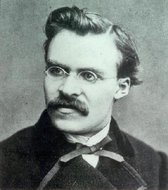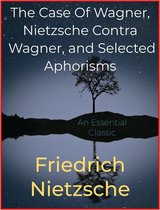The Case of Wagner, Nietzsche Contra Wagner and Selected Aphorisms Ebook Tooltip Ebooks kunnen worden gelezen op uw computer en op daarvoor geschikte e-readers.
Afbeeldingen
Artikel vergelijken
- Engels
- E-book
- 9781465503060
- 24 februari 2021
- Adobe ePub
Friedrich Nietzsche
Een van Nietzsches meest bekende werken is ‘Also sprach Zarathustra’, dat na de Bijbel het meest gelezen boek van de Duitse soldaten aan het front tijdens de Eerste Wereldoorlog was. In het begin van de twintigste eeuw had Nietzsche veel invloed op diverse Duitse dichters. Nietzsches filosofie werd ook misbruikt door het opkomende nazisme, krachtig gesteund door zijn zus Elisabeth. Zij had namelijk de vrijheid genomen veel van Nietzsches werk te herschrijven, op zodanige manier dat het nazi-vriendelijker werd. Na de Tweede Wereldoorlog werd zijn filosofie 'gedenazificeerd'. In de voormalige DDR waren zijn boeken tot aan de val van de Muur verboden.
Samenvatting
Nietzsche wrote the rough draft of “The Case of Wagner” in Turin, during the month of May 1888; he completed it in Sils Maria towards the end of June of the same year, and it was published in the following autumn. “Nietzsche contra Wagner” was written about the middle of December 1888; but, although it was printed and corrected before the New Year, it was not published until long afterwards owing to Nietzsche’s complete breakdown in the first days of 1889. In reading these two essays we are apt to be deceived, by their virulent and forcible tone, into believing that the whole matter is a mere cover for hidden fire,—a mere blind of æsthetic discussion concealing a deep and implacable personal feud which demands and will have vengeance. In spite of all that has been said to the contrary, many people still hold this view of the two little works before us; and, as the actual facts are not accessible to every one, and rumours are more easily believed than verified, the error of supposing that these pamphlets were dictated by personal animosity, and even by Nietzsche’s envy of Wagner in his glory, seems to be a pretty common one. another very general error is to suppose that the point at issue here is not one concerning music at all, but concerning religion. It is taken for granted that the aspirations, the particular quality, the influence, and the method of an art like music, are matters quite distinct from the values and the conditions prevailing in the culture with which it is in harmony, and that however many Christian elements may be discovered in Wagnerian texts, Nietzsche had no right to raise æsthetic objections because he happened to entertain the extraordinary view that these Christian elements had also found their way into Wagnerian music. To both of these views there is but one reply:—they are absolutely false. In the “Ecce Homo,” Nietzsche’s autobiography,—a book which from cover to cover and line for line is sincerity itself—we learn what Wagner actually meant to Nietzsche. On pages 41, 44, 84, 122, 129, &c, we cannot doubt that Nietzsche is speaking from his heart,—and what does he say?—In impassioned tones he admits his profound indebtedness to the great musician, his love for him, his gratitude to him,—how Wagner was the only German who had ever been anything to him—how his friendship with Wagner constituted the happiest and most valuable experience of his life,—how his breach with Wagner almost killed him
Productspecificaties
Inhoud
- Taal
- en
- Bindwijze
- E-book
- Oorspronkelijke releasedatum
- 24 februari 2021
- Ebook Formaat
- Adobe ePub
Betrokkenen
- Hoofdauteur
- Friedrich Nietzsche
- Hoofduitgeverij
- Library Of Alexandria
Lees mogelijkheden
- Lees dit ebook op
- Android (smartphone en tablet) | Kobo e-reader | Desktop (Mac en Windows) | iOS (smartphone en tablet) | Windows (smartphone en tablet)
Overige kenmerken
- Studieboek
- Nee
EAN
- EAN
- 9781465503060
Je vindt dit artikel in
- Categorieën
- Taal
- Engels
- Boek, ebook of luisterboek?
- Ebook
- Beschikbaar in Kobo Plus
- Beschikbaar in Kobo Plus
- Beschikbaarheid
- Leverbaar
Kies gewenste uitvoering
Prijsinformatie en bestellen
De prijs van dit product is 4 euro en 99 cent.- E-book is direct beschikbaar na aankoop
- E-books lezen is voordelig
- Dag en nacht klantenservice
- Veilig betalen
Rapporteer dit artikel
Je wilt melding doen van illegale inhoud over dit artikel:
- Ik wil melding doen als klant
- Ik wil melding doen als autoriteit of trusted flagger
- Ik wil melding doen als partner
- Ik wil melding doen als merkhouder
Geen klant, autoriteit, trusted flagger, merkhouder of partner? Gebruik dan onderstaande link om melding te doen.








